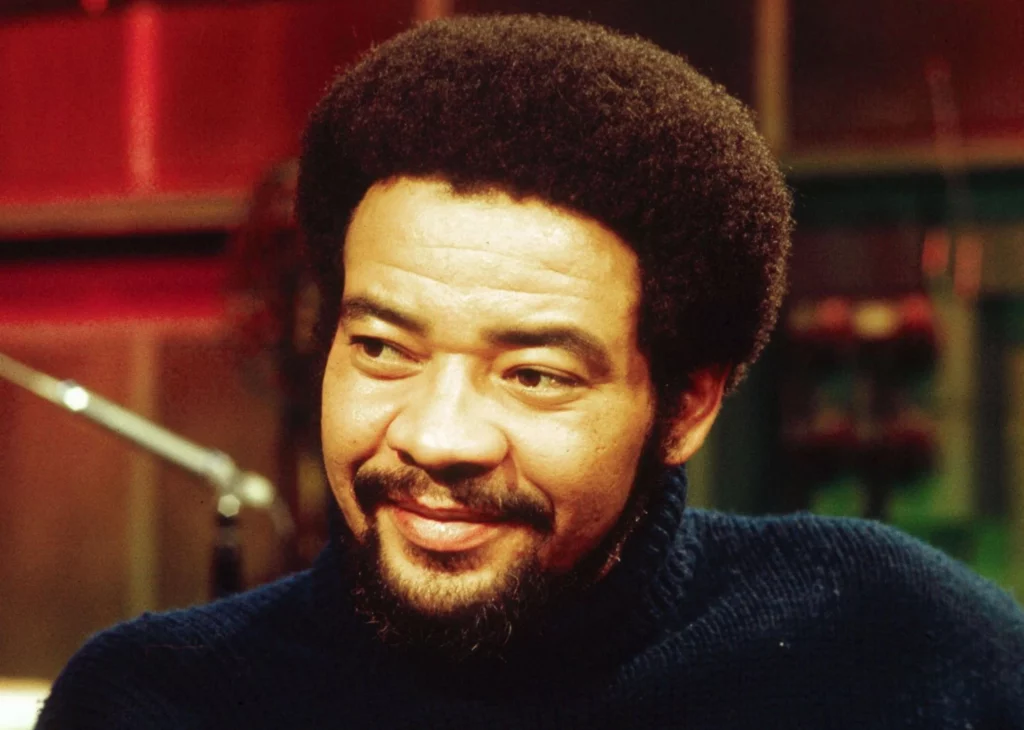Bill Withers was a talented singer and songwriter who created music with a rich sound that had to ability to comfort the listener through both his sound and beautifully complex lyrics
“Men have problems admitting to losing things. I think women are much better at that…So, once in my life, I wanted to forgo my own male ego and admit to losing something, so I came up with- Ain’t no sunshine when she’s gone/ It’s not warm when she’s away/Ain’t no sunshine when she’s gone/And she’s always gone too long, any time she goes away.”

The History Behind the artist Bill Withers
Bill Withers, born William Harrison Withers, Jr., was born July 4, 1938, in Slab Fork, West Virginia. He was the youngest of six children, with his mother being a maid and his father being a miner. Withers was raised primarily by his mother’s family after the divorce of his parents at three years old, when he moved to Beckley. As a kid, he struggled with having asthma and a stutter. Where Withers grew up, coal mining was the only industry where men could be successful. Withers was the first and only man in his family to not work in the coal mining industry. At the age of seventeen, he joined the navy where he served for nine years. It was when he was stationed in Guam that he took to the music of artists like Johnny Mathis that was played in local bars, and his musical career began soon after.
Music Career
Early Career
Bill first began singing when he overhead the conversation of a club owner who was complaining of how expensive it was to pay Lou Rawls to come and play especially since he was always showing up late. Not long after, Bill bought a guitar and began creating music. Withers would record himself and leave the tapes around, and eventually, with the assistance of Ray Jackson, a pianist and trombone player helped him create a demo. It was this demo that allowed for his discovery by Clarence Avant, who signed him to Sussex Records.

Career Prime
After the release of his first album, Just As I Am, Withers enjoyed immediate success. He released his second album, Still Bill just one year later. He made many appearances such as The Johnny Carson Show. Withers went on to perform at Carnegie Hall which resulted in his third album in 1973. “Lean on Me” and “Use Me” were some of his most famous songs during this period of his career. Some of his contemporaries included artists such as Marvin Gaye, Ray Charles, and Earth, Wind, & Fire.


Late Career
Withers began his career a bit later in life than most artists, being that he was in his 30s when his first album came out. As a result, he only stayed in the limelight for a short period of time. In 1974, he left Sussex Records for Columbia. During his time with this record label, his music could be characterized as more conventionally romantic. Some of his most popular songs during this time were “Lovely Day” and “Just the Two of Us”, his collaboration with Grover Washington Jr. In 1985, he released his last album, Watching You, Watching Me. At this point in his life, he had become overwhelmingly frustrated with his label company and the music industry, and therefore he left music behind and lived a regular, private life until his death in 2020.

Awards and Social Involvement
Grammy Awards
- Best R&B Song of the Year for “Ain’t No Sunshine” in 1971
- Best R&B Song of the Year for “Just The Two Of Us” in 1981
- Best R&B Song of the Year for “Lean On Me” in 1987
Honors
- Soul Train Hall of Fame in 1995
- Grammy Hall of Fame “Ain’t No Sunshine” in 1999
- Songwriters Hall of Fame in 2005
- ASCAP Rhythm & Soul-Heritage Award in 2006
- West Virginia Music Hall of Fame in 2007
- Grammy Hall of Fame “Lean On Me” in 2007
- Rhythm & Blues Foundation-Pioneer Award in 2008
- Rock and Roll Hall of Fame in 2015
Bill Withers was not very “socially involved” besides his service in the military before his music career began. Though his music did not speak on social issues, his music was loved by the community, as it spoke to their true daily life experiences.
In conclusion, Bill Withers was a phenomenal artist, whose voice was soothing and strong. Withers created music that spoke on the raw emotions that he experienced- love, jealousy, pain, making his music truly resonate with his audience. He was an artist that stayed true to himself until the end.
Bibliography
Frere-Jones, S. (2010, Mar 08). AS IS: POP MUSIC. The New Yorker, 86, 76-n/a. Retrieved from https://www.proquest.com/magazines/as-is/docview/233147470/se-2
Hill, S. (2020, Apr 03). Bill withers talked about his classic hits and why he left the music industry in rare video interview (watch). Black Enterprise (Online), Retrieved from https://www.proquest.com/magazines/bill-withers-talked-about-his-classic-hits-why-he/docview/2755494877/se-2
Mitchell, Gail. “Bill Withers: The Complete Sussex and Columbia Masters.” Billboard, vol. 124, no. 41, 17 Nov. 2012, p. 40. Gale OneFile: Pop Culture Studies, link.gale.com/apps/doc/A308884712/PPOP?u=auctr_woodruff&sid=bookmark-PPOP&xid=0210c785. Accessed 10 Mar. 2023.
Neal, Mark Anthony. “Bill Withers’ Legacy Is so Much Deeper than the Hits We All Know.” NPR, NPR, 4 Apr. 2020, https://www.npr.org/2020/04/04/827315057/bill-withers-legacy-is-so-much-deeper-than-the-hits-we-all-know.
Pareles, Jon. “Bill Withers And Soulful Selflessness.” New York Times, 6 Apr. 2020, p. C1(L). Gale OneFile: Fine Arts, link.gale.com/apps/doc/A619533480/PPFA?u=auctr_woodruff&sid=bookmark-PPFA&xid=80434740. Accessed 10 Mar. 2023.


